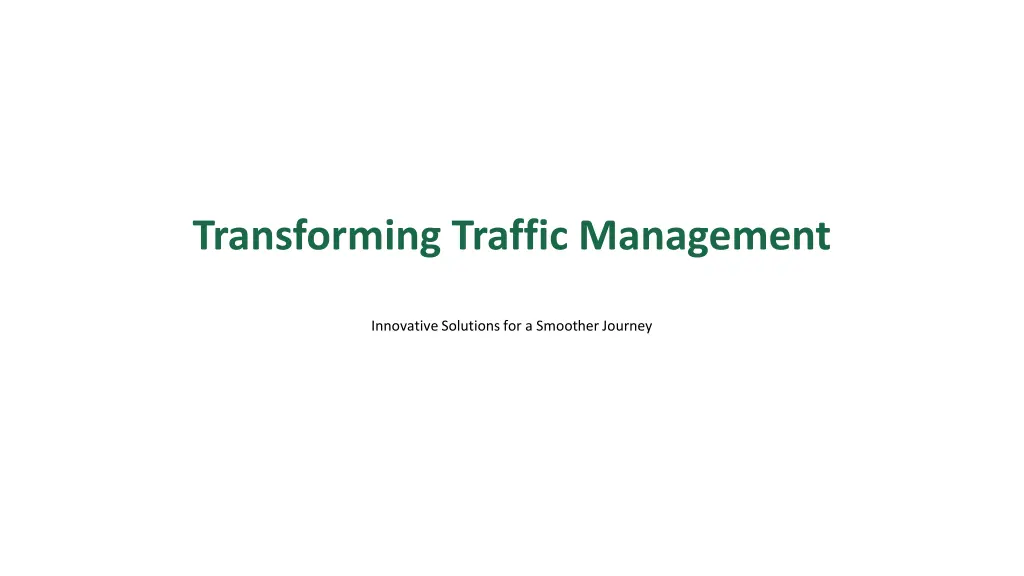
Innovative Solutions for Urban Traffic Management
Discover innovative solutions for tackling global traffic congestion through smart traffic signal systems, data-driven traffic management, public transportation enhancement, and sustainable mobility solutions. Learn how these technologies and strategies are transforming urban traffic management to create a smoother journey while addressing key challenges like time loss, pollution, and urban growth sustainability.
Download Presentation

Please find below an Image/Link to download the presentation.
The content on the website is provided AS IS for your information and personal use only. It may not be sold, licensed, or shared on other websites without obtaining consent from the author. If you encounter any issues during the download, it is possible that the publisher has removed the file from their server.
You are allowed to download the files provided on this website for personal or commercial use, subject to the condition that they are used lawfully. All files are the property of their respective owners.
The content on the website is provided AS IS for your information and personal use only. It may not be sold, licensed, or shared on other websites without obtaining consent from the author.
E N D
Presentation Transcript
Transforming Traffic Management Innovative Solutions for a Smoother Journey
01 The Growing Challenge of Traffic Congestion Table of Contents 02 Smart Traffic Signal Systems 03 Data-Driven Traffic Management 04 Public Transportation Enhancement 05 Intelligent Traffic Control Centers 06 Autonomous Vehicles and Their Impact 07 Sustainable Mobility Solutions 08 Community Engagement in Traffic Planning 09 Innovations in Parking Management 10 Thank You for Your Attention!
1 The Growing Challenge of Traffic Congestion Traffic congestion is a global challenge affecting urban areas, leading to significant time loss and increased pollution. Recent studies indicate that congestion costs economies billions annually, highlighting the need for effective traffic management solutions. Understanding the root causes is key: high vehicle density, inadequate infrastructure, and rising urban populations contribute to the problem. Implementing effective traffic management is necessary not only for efficiency but also for sustainable urban growth. Innovative strategies and technologies are being developed worldwide to tackle these issues effectively.
2 Smart Traffic Signal Systems Smart traffic signals are revolutionizing urban traffic management by optimizing signal timings in real-time based on traffic conditions. These systems use sensors and AI to adjust light cycles and reduce waiting times, improving flow. Cities implementingsmart signals have seen reductions in congestion and even improved pedestrian safety. Integrating smart systems can lead to a seamless interaction between vehicles and infrastructure. Promoting collaboration among urban planners, traffic engineers, and technology providers is essential for widespread implementation.
3 Data-Driven Traffic Management Data analytics play a pivotal role in understanding traffic patterns and behaviors, allowing for informed decision-making. Big data from various sources, including GPS, mobile apps, and cameras, aids in predicting traffic trends and peak times. Cities can allocate resources effectively, reduce congestion, and improve public transport services through data analysis. Continuous data collection fosters adaptive traffic management systems that evolve with urbangrowth. Investing in robust data infrastructures is critical for any modern traffic management initiative.
4 Public Transportation Enhancement Improving public transportation systems is paramount to reducing dependence on personal vehicles and easing traffic. Solutions include increasing service frequency, expanding routes, and integrating transportation modes for better accessibility. City planning must prioritize public transport systems as a viable alternative to individual commuting. Successful public transit initiatives can lead to a significant decrease in urbantraffic congestion. Engaging the community in transit planningprocesses enhances adoption and satisfaction.
5 Intelligent Traffic Control Centers Traffic control centers equipped with advanced technology allow for real-time monitoring and management of city traffic flows. These centers enable quick responses to incidents, improving safety and minimizing disruptions. Integrating various transportation systems under one platform promotes better communication and coordination. Investing in such centers empowers cities to proactively manage traffic, rather than reactively responding to chaos. Training personnel to utilize these systems efficiently is equally crucial.
6 Autonomous Vehicles and Their Impact The rise of autonomous vehicles presents both challenges and opportunities in traffic management arenas. Through enhanced data sharing and communication among vehicles, autonomy could lead to smoother traffic flows. Challenges include regulatory frameworks, infrastructure adaptations, and ensuring public trust in technology. A gradual integration strategy, collaborating with tech innovators, will smoothen the transition. Fostering an ecosystem that supports autonomous technologies is essential for future traffic management.
7 Sustainable Mobility Solutions Emphasizing sustainable mobility can significantly alleviate traffic congestion while benefiting the environment. Promoting cycling, walking, and electric vehicles reduces reliance on fossil fuels and personal vehicles. Cities can invest in green infrastructure, like bike lanes and electric charging stations, to support these choices. Public awareness campaigns can encourage individuals to adopt sustainable transporthabits. Creating a culture of sustainability is crucial for long-term success.
8 Community Engagement in Traffic Planning Active community involvement in traffic planning can lead to more effective and accepted traffic management solutions. Gathering inputthroughpublic forums, surveys, and workshops helps understandlocal needs and concerns. Transparent communication about the benefits of proposed solutions fosters community support and collaboration. Educated communities are more likely to embrace changes that benefit overall mobility. Building trust throughengagement is an essential step in successful traffic management.
9 Innovations in Parking Management Effective parking management reduces congestion by ensuring efficient use of parking resources. Innovations like smart parking apps guide drivers to available spots, minimizing cruising and reducing emissions. Diverse parking solutions, including shared and remote parking areas, help manage peak demand. Transitioning to dynamic pricing models encourages more sustainable parking choices. Innovative approaches in parking can significantly transform urbancongestion.
10 Thank You for Your Attention! Thank you for exploring traffic management solutions with us. The journeytowards smarter traffic solutions involves collaboration, innovation, and commitment. Together, we can foster sustainable urbanmobility and enhance quality of life. Let s pave the way to a smoother, more efficient future for all road users. Feel free to reach out for furtherdiscussions or inquiries.
